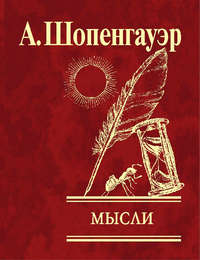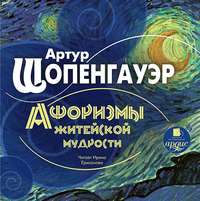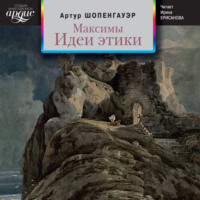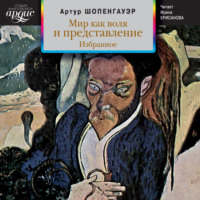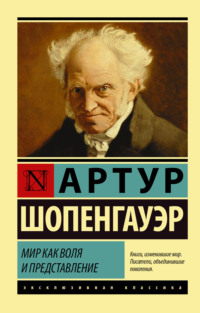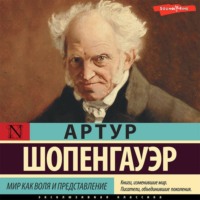 полная версия
полная версияThe World as Will and Idea (Vol. 3 of 3)
However discouraging to metaphysics this essential limitation of the intellect may be, which arises from its nature and origin, it has yet another side which is very consoling. It deprives the direct utterances of nature of their unconditional validity, in the assertion of which naturalism proper consists. If, therefore, nature presents to us every living thing as appearing out of nothing, and, after an ephemeral existence, returning again for ever to nothing, and if it seems to take pleasure in the unceasing production of new beings, in order that it may be able unceasingly to destroy, and, on the other hand, is unable to bring anything permanent to light; if accordingly we are forced to recognise matter as that which alone is permanent, which never came into being and never passes away, but brings forth all things from its womb, whence its name appears to be derived from mater rerum, and along with it, as the father of things, form, which, just as fleeting as matter is permanent, changes really every moment, and can only maintain itself so long as it clings as a parasite to matter (now to one part of it, now to another), but when once it entirely loses hold, disappears, as is shown by the palæotheria and the ichthyosaurians, we must indeed recognise this as the direct and genuine utterance of nature, but on account of the origin of the intellect explained above, and the nature of it which results from this origin, we cannot ascribe to this utterance an unconditional truth, but rather only an entirely conditional truth, which Kant has appropriately indicated as such by calling it the phenomenon in opposition to the thing in itself.
If, in spite of this essential limitation of the intellect, it is possible, by a circuitous route, to arrive at a certain understanding of the world and the nature of things, by means of reflection widely pursued, and the skilful combination of objective knowledge directed towards without, with the data of self-consciousness, this will yet be only a very limited, entirely indirect, and relative understanding, a parabolical translation into the forms of knowledge, thus a quadam prodire tenus, which must always leave many problems still unsolved. On the other hand, the fundamental error of the old dogmatism in all its forms, which was destroyed by Kant, was this, that it started absolutely from knowledge, i.e., the world as idea, in order to deduce and construct from its laws being in general, whereby it accepted that world of idea, together with its laws, as absolutely existing and absolutely real; while its whole existence is throughout relative, and a mere result or phenomenon of the true being which lies at its foundation, – or, in other words, that it constructed an ontology when it had only materials for a dianoiology. Kant discovered the subjectively conditioned and therefore entirely immanent nature of knowledge, i. e., its unsuitableness for transcendental use, from the constitution of knowledge itself; and therefore he very appropriately called his doctrine the Critique of Reason. He accomplished this partly by showing the important and thoroughly a priori part of all knowledge, which, as throughout subjective, spoils all objectivity, and partly by professedly proving that if they were followed out to the end the principles of knowledge, taken as purely objective, led to contradictions. He had, however, hastily assumed that, apart from objective knowledge, i. e., apart from the world as idea, there is nothing given us except conscience, out of which he constructed the little that still remained of metaphysics, his moral theology, to which, however, he attributed absolutely only a practical validity, and no theoretical validity at all. He had overlooked that although certainly objective knowledge, or the world as idea, affords nothing but phenomena, together with their phenomenal connection and regressus, yet our own nature necessarily also belongs to the world of things in themselves, for it must have its root in it. But here, even if the root itself cannot be brought to light, it must be possible to gather some data for the explanation of the connection of the world of phenomena with the inner nature of things. Thus here lies the path upon which I have gone beyond Kant and the limits which he drew, yet always restricting myself to the ground of reflection, and consequently of honesty, and therefore without the vain pretension of intellectual intuition or absolute thought which characterises the period of pseudo-philosophy between Kant and me. In his proof of the insufficiency of rational knowledge to fathom the nature of the world Kant started from knowledge as a fact, which our consciousness affords us, thus in this sense he proceeded a posteriori. But in this chapter, and also in my work, “Ueber den Willen in der Natur,” I have sought to show what knowledge is in its nature and origin, something secondary, designed for individual ends; whence it follows that it must be insufficient to fathom the nature of the world. Thus so far I have reached the same goal a priori. But one never knows anything wholly and completely until one has gone right round it for that purpose, and has got back to it from the opposite side from which one started. Therefore also, in the case of the important fundamental knowledge here considered, one must not merely go from the intellect to the knowledge of the world, as Kant has done, but also from the world, taken as given, to the intellect, as I have undertaken here. Then this physiological consideration, in the wider sense, becomes the supplement of that ideological, as the French say, or, more accurately, transcendental consideration.
In the above, in order not to break the thread of the exposition, I have postponed the explanation of one point which I touched upon. It was this, that in proportion as, in the ascending series of animals, the intellect appears ever more developed and complete, knowledge always separates itself more distinctly from will, and thereby becomes purer. What is essential upon this point will be found in my work, “Ueber den Willen in der Natur,” under the heading, “Pflanzenphysiologie” (p. 68-72 of the second, and 74-77 of the third edition), to which I refer, in order to avoid repetition, and merely add here a few remarks. Since the plant possesses neither irritability nor sensibility, but the will objectifies itself in it only as plastic or reproductive power, it has neither muscle nor nerve. In the lowest grades of the animal kingdom, in zoophites, especially in polyps, we cannot as yet distinctly recognise the separation of these two constituent parts, but still we assume their existence, though in a state of fusion; because we perceive movements which follow, not, as in the case of plants, upon mere stimuli, but upon motives, i. e., in consequence of a certain apprehension. Now in proportion as, in the ascending series of animals, the nervous and muscular systems separate ever more distinctly from each other, till in the vertebrate animals, and most completely in man, the former divides into an organic and a cerebral nervous system, and of these the latter again develops into the excessively complicated apparatus of the cerebrum and cerebellum, spinal marrow, cerebral and spinal nerves, sensory and motor nerve fascicles, of which only the cerebrum, together with the sensory nerves depending upon it, and the posterior spinal nerve fascicles are intended for the apprehension of the motive from the external world, while all the other parts are intended for the transmission of the motive to the muscles in which the will manifests itself directly; in the same proportion does the motive separate ever more distinctly in consciousness from the act of will which it calls forth, thus the idea from the will; and thereby the objectivity of consciousness constantly increases, for the ideas exhibit themselves ever more distinctly and purely in it. These two separations are, however, really only one and the same, which we have here considered from two sides, the objective and the subjective, or first in the consciousness of other things and then in self-consciousness. Upon the degree of this separation ultimately depends the difference and the gradation of intellectual capacity, both between different kinds of animals and between individual human beings; thus it gives the standard for the intellectual completeness of these beings. For the clearness of the consciousness of the external world, the objectivity of the perception, depends upon it. In the passage referred to above I have shown that the brute only perceives things so far as they are motives for its will, and that even the most intelligent of the brutes scarcely overstep these limits, because their intellect is too closely joined to the will from which it has sprung. On the other hand, even the stupidest man comprehends things in some degree objectively; for he recognises not merely what they are with reference to him, but also something of what they are with reference to themselves and to other things. Yet in the case of very few does this reach such a degree that they are in a position to examine and judge of anything purely objectively; but “that must I do, that must I say, that must I believe,” is the goal to which on every occasion their thought hastens in a direct line, and at which their understanding at once finds welcome rest. For thinking is as unendurable to the weak head as the lifting of a burden to the weak arm; therefore both hasten to set it down. The objectivity of knowledge, and primarily of perceptive knowledge, has innumerable grades, which depend upon the energy of the intellect and its separation from the will, and the highest of which is genius, in which the comprehension of the external world becomes so pure and objective that to it even more reveals itself directly in the individual thing than the individual thing itself, namely, the nature of its whole species, i. e., its Platonic Idea; which is brought about by the fact that in this case the will entirely vanishes from consciousness. Here is the point at which the present investigation, starting from physiological grounds, connects itself with the subject of our third book, the metaphysics of the beautiful, where æsthetic comprehension proper, which, in a high degree, is peculiar to genius alone, is fully considered as the condition of pure, i. e., perfectly will-less, and on that account completely objective knowledge. According to what has been said, the rise of intelligence, from the obscurest animal consciousness up to that of man, is a progressive loosening of the intellect from the will, which appears complete, although only as an exception, in the genius. Therefore genius may be defined as the highest grade of the objectivity of knowledge. The condition of this, which so seldom occurs, is a decidedly larger measure of intelligence than is required for the service of the will, which constitutes its basis; it is accordingly this free surplus which first really properly comes to know the world, i. e., comprehends it perfectly objectively, and now paints pictures, composes poems, and thinks in accordance with this comprehension.
Chapter XXIII.3On The Objectification Of The Will In Unconscious Nature
That the will which we find within us does not proceed, as philosophy has hitherto assumed, first from knowledge, and indeed is a mere modification of it, thus something secondary, derived, and, like knowledge itself, conditioned by the brain; but that it is the prius of knowledge, the kernel of our nature, and that original force itself which forms and sustains the animal body, in that it carries out both its unconscious and its conscious functions; – this is the first step in the fundamental knowledge of my metaphysics. Paradoxical as it even now seems to many that the will in itself is without knowledge, yet the scholastics in some way already recognised and confessed it; for Jul. Cæs. Vaninus (that well-known sacrifice to fanaticism and priestly fury), who was thoroughly versed in their philosophy, says in his “Amphitheatro,” p. 181: “Voluntas potentia cœca est, ex scholasticorum opinione.” That, further, it is that same will which in the plant forms the bud in order to develop the leaf and the flower out of it; nay, that the regular form of the crystal is only the trace which its momentary effort has left behind, and that in general, as the true and only αυτοματον, in the proper sense of the word, it lies at the foundation of all the forces of unorganised nature, plays, acts, in all their multifarious phenomena, imparts power to their laws, and even in the crudest mass manifests itself as gravity; – this insight is the second step in that fundamental knowledge, and is brought about by further reflection. But it would be the grossest misunderstanding to suppose that this is a mere question of a word to denote an unknown quantity. It is rather the most real of all real knowledge which is here expressed in language. For it is the tracing back of that which is quite inaccessible to our immediate knowledge, and therefore in its essence foreign and unknown to us, which we denote by the words force of nature, to that which is known to us most accurately and intimately, but which is yet only accessible to us in our own being and directly, and must therefore be carried over from this to other phenomena. It is the insight that what is inward and original in all the changes and movements of bodies, however various they may be, is in its nature identical; that yet we have only one opportunity of getting to know it more closely and directly, and that is in the movements of our own body. In consequence of this knowledge we must call it will. It is the insight that that which acts and strives in nature, and exhibits itself in ever more perfect phenomena, when it has worked itself up so far that the light of knowledge falls directly upon it, i. e., when it has attained to the state of self-consciousness – exists as that will, which is what is most intimately known to us, and therefore cannot be further explained by anything else, but rather affords the explanation of all other things. It is accordingly the thing in itself so far as this can ever be reached by knowledge. Consequently it is that which must express itself in some way in everything in the world, for it is the inner nature of the world and the kernel of all phenomena.
As my essay, “Ueber den Willen in der Natur,” specially refers to the subject of this chapter, and also adduces the evidence of unprejudiced empiricists in favour of this important point of my doctrine, I have only to add now to what is said there a few supplementary remarks, which are therefore strung together in a somewhat fragmentary manner.
First, then, with reference to plant life, I draw attention to the remarkable first two chapters of Aristotle's work upon plants. What is most interesting in them, as is so often the case with Aristotle, are the opinions of earlier profound philosophers quoted by him. We see there that Anaxagoras and Empedocles quite rightly taught that plants have the motion of their growth by virtue of their indwelling desires (επιθυμια); nay, that they also attributed to them pleasure and pain, therefore sensation. But Plato only ascribed to them desires, and that on account of their strong appetite for nutrition (cf. Plato in the “Timœus,” p. 403, Bip.) Aristotle, on the other hand, true to his customary method, glides on the surface of things, confines himself to single characteristics and conceptions fixed by current expressions, and asserts that without sensation there can be no desires, and that plants have not sensation. He is, however, in considerable embarrassment, as his confused language shows, till here also, “where fails the comprehension, a word steps promptly in as deputy,” namely, το θρεπτικον, the faculty of nourishing. Plants have this, and thus a part of the so-called soul, according to his favourite division into anima vegetativa, sensitiva, and intellectiva. This, however, is just a scholastic Quidditas, and signifies plantœ nutriuntur quia habent facultatem nutritivam. It is therefore a bad substitute for the more profound research of his predecessors, whom he is criticising. We also see, in the second chapter, that Empedocles even recognised the sexuality of plants; which Aristotle then also finds fault with, and conceals his want of special knowledge behind general propositions, such as this, that plants could not have both sexes combined, for if so they would be more complete than animals. By quite an analogous procedure he displaces the correct astronomical system of the world of the Pythagoreans, and by his absurd fundamental principles, which he specially explains in the books de Cœlo, introduces the system of Ptolemy, whereby mankind was again deprived of an already discovered truth of the greatest importance for almost two thousand years.
I cannot refrain from giving here the saying of an excellent biologist of our own time who fully agrees with my teaching. It is G. R. Treviranus, who, in his work, “Ueber die Erscheinungen und Gesetze des organischen Lebens,” 1832, Bd. 2, Abth. 1, § 49, has said what follows: “A form of life is, however, conceivable in which the effect of the external upon the internal produces merely feelings of desire or dislike. Such is the life of plants. In the higher forms of animal life the external is felt as something objective.” Treviranus speaks here from pure unprejudiced comprehension of nature, and is as little conscious of the metaphysical importance of his words as of the contradictio in adjecto which lies in the conception of something “felt as objective,” a conception which indeed he works out at great length. He does not know that all feeling is essentially subjective, and all that is objective is, on the other hand, perception, and therefore a product of the understanding. Yet this does not detract at all from the truth and importance of what he says.
In fact, in the life of plants the truth that will can exist without knowledge is apparent – one might say palpably recognisable. For here we see a decided effort, determined by wants, modified in various ways, and adapting itself to the difference of the circumstances, yet clearly without knowledge. And just because the plant is without knowledge it bears its organs of generation ostentatiously in view, in perfect innocence; it knows nothing about it. As soon, on the other hand, as in the series of existences knowledge appears the organs of generation are transferred to a hidden part. Man, however, with whom this is again less the case, conceals them intentionally: he is ashamed of them.
Primarily, then, the vital force is identical with the will, but so also are all other forces of nature; though this is less apparent. If, therefore, we find the recognition of a desire, i. e., of a will, as the basis of plant life, expressed at all times, with more or less distinctness of conception, on the other hand, the reference of the forces of unorganised nature to the same foundation is rarer in proportion as their remoteness from our own nature is greater. In fact, the boundary between the organised and the unorganised is the most sharply drawn in the whole of nature, and perhaps the only one that admits of no transgressions; so that natura non facit saltus seems to suffer an exception here. Although certain crystallisations display an external form resembling the vegetable, yet even between the smallest lichen, the lowest fungus, and everything unorganised there remains a fundamental and essential difference. In the unorganised body that which is essential and permanent, thus that upon which its identity and integrity rests, is the material, the matter; what is unessential and changing is, on the other hand, the form. With the organised body the case is exactly reversed; for its life, i. e., its existence as an organised being, simply consists in the constant change of the material, while the form remains permanent. Its being and its identity thus lies in the form alone. Therefore the continuance of the unorganised body depends upon repose and exclusion from external influences: thus alone does it retain its existence; and if this condition is perfect, such a body lasts for ever. The continuance of the organised body, on the contrary, just depends upon continual movement and the constant reception of external influences. As soon as these are wanting and the movement in it stops it is dead, and thereby ceases to be organic, although the trace of the organism that has been still remains for a while. Therefore the talk, which is so much affected in our own day, of the life of what is unorganised, indeed of the globe itself, and that it, and also the planetary system, is an organism, is entirely inadmissible. The predicate life belongs only to what is organised. Every organism, however, is throughout organised, is so in all its parts; and nowhere are these, even in their smallest particles, composed by aggregation of what is unorganised. Thus if the earth were an organism, all mountains and rocks, and the whole interior of their mass, would necessarily be organised, and accordingly really nothing unorganised would exist; and therefore the whole conception of it would be wanting.
On the other hand, that the manifestation of a will is as little bound up with life and organisation as with knowledge, and that therefore the unorganised has also a will, the manifestations of which are all its fundamental qualities, which cannot be further explained, – this is an essential point in my doctrine; although the trace of such a thought is far seldomer found in writers who have preceded me than that of the will in plants, where, however, it is still unconscious.
In the forming of the crystal we see, as it were, a tendency towards an attempt at life, to which, however, it does not attain, because the fluidity of which, like a living thing, it is composed at the moment of that movement is not enclosed in a skin, as is always the case with the latter, and consequently it has neither vessels in which that movement could go on, nor does anything separate it from the external world. Therefore, rigidity at once seizes that momentary movement, of which only the trace remains as the crystal.
The thought that the will, which constitutes the basis of our own nature, is also the same will which shows itself even in the lowest unorganised phenomena, on account of which the conformity to law of both phenomena shows a perfect analogy, lies at the foundation of Goethe's “Wahlverwandtschaften,” as the title indeed indicates, although he himself was unconscious of this.
Mechanics and astronomy specially show us how this will conducts itself so far as it appears at the lowest grade of its manifestation merely as gravity, rigidity, and inertia. Hydraulics shows us the same thing where rigidity is wanting and the fluid material is now unrestrainedly surrendered to its predominating passion, gravity. In this sense hydraulics may be conceived as a characteristic sketch of water, for it presents to us the manifestations of will to which water is moved by gravity; these always correspond exactly to the external influences, for in the case of all non-individual existences there is no particular character in addition to the general one; thus they can easily be referred to fixed characteristics, which are called laws, and which are learned by experience of water. These laws accurately inform us how water will conduct itself under all different circumstances, on account of its gravity, the unconditioned mobility of its parts, and its want of elasticity. Hydrostatics teaches how it is brought to rest through gravity; hydrodynamics, how it is set in motion; and the latter has also to take account of hindrances which adhesion opposes to the will of water: the two together constitute hydraulics. In the same way Chemistry teaches us how the will conducts itself when the inner qualities of materials obtain free play by being brought into a fluid state, and there appears that wonderful attraction and repulsion, separating and combining, leaving go of one to seize upon another, from which every precipitation originates, and the whole of which is denoted by “elective affinity” (an expression which is entirely borrowed from the conscious will). But Anatomy and Physiology allow us to see how the will conducts itself in order to bring about the phenomenon of life and sustain it for a while. Finally, the poet shows us how the will conducts itself under the influence of motives and reflection. He exhibits it therefore for the most part in the most perfect of its manifestations, in rational beings, whose character is individual, and whose conduct and suffering he brings before us in the Drama, the Epic, the Romance, &c. The more correctly, the more strictly according to the laws of nature his characters are there presented, the greater is his fame; hence Shakespeare stands at the top. The point of view which is here taken up corresponds at bottom to the spirit in which Goethe followed and loved the natural sciences, although he was not conscious of the matter in the abstract. Nay more, this not only appears from his writings, but is also known to me from his personal utterances.


